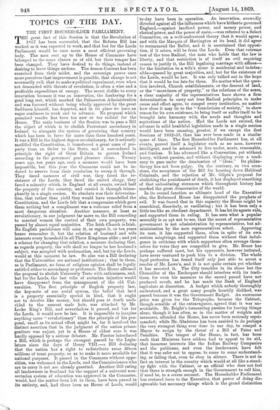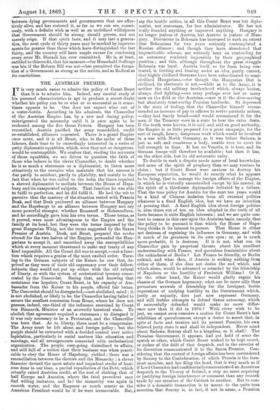TOPICS OF THE DAY.
THE FIRST HOUSEHOLDER PARLIAMENT.
THE great fact of this Session is that the Revolution of 1867 has been successful, that the Reform Bill has worked as it was expected to work, and that but for the Lords Parliament would be once more a most efficient governing body. The men sent up to the House of Commons have belonged to the same classes as of old, but their temper has been changed. They have desired to do things, instead of desiring to leave things undone. The demon Content has been exorcised from their midst, and the sovereign power once more perceives that improvement is possible, that change is not necessarily evil, that to make a political experiment, even when not demanded with threats of revolution, is often a wise and a profitable expenditure of energy. The secret dislike to every innovation because it was an innovation, the hankering for a good long rest, which marked the Palmerston Administration and was fostered without being wholly approved by the great Sadducee himself, has departed, and in its place we have an eager readiness to work and to advance. No proposal which promised results has been too new or too radical for the House. The main business of the Session was to pass a Bill the object of which is to abolish Protestant ascendancy in Ireland, to abrogate the system of governing that country which has been in force for more than three hundred years. It was a Bill in the highest degree revolutionary, for it seriously modified the Constitution, it transferred a great mass of pro- perty from an Order to the State, and it surrendered in principle the right of Great Britain to govern Ireland according to the governors' good pleasure alone. Twenty years ago, ten years ago, such a measure would have been impossible, but this year the Commons could not be in- duced to swerve from their resolution to sweep it through. They faced menaces of civil war, they faced the re- sistance of the Lords, they faced the united clergy, they faced a minority which, in England at all events, owned half the property of the country, and carried it through trium- phantly in a single session. So absolute was their determina- tion, that rather than yield they would have remodelled the Constitution, and the Lords felt that a compromise which gave them nothing but a compliment was a welcome relief from a most dangerous situation. Another measure, at least as revolutionary, in our judgment far more so, the Bill conceding to married women the control of their own property, was passed by almost equal majorities. The Irish Church is Irish. No English parishioner will miss it, or regret it, or ten years hence remember it, but the relation of husband and wife interests every household in all Three Kingdoms alike ; and yet a scheme for changing that relation, a measure declaring that, as regards property, the wife shall no longer be her husband's subject, was accepted with acclimation, and, but for the Lords, would at this moment be law. So also was a Bill declaring that the Universities are national institutions ; that in them, as in Parliament, no form of religious opinion shall be legally entitled either to ascendancy or preference. The House affirmed the proposal to abolish University Tests with enthusiasm, and, but for the Lords, the last relic of sectarian injustice would have disappeared from the management of the old Uni- versities. The first principle of English property law, the key-note of our social system, the belief that lard is a property essentially special in kind, that it ought not to devolve like money, but should pass at death undi- vided to the nearest male heir, was attacked by Mr. Locke King's Bill, and nevertheless it passed, and but for the Lords, it would now be law. It is impossible to imagine anything more " revolutionary" than the principle of his pro- posal, small as its actual effect might be, for it involved the distinct assertion that in the judgment of the nation primo- geniture was unjust, yet in a House of eldest sons it was hardly opposed by a serious debater. Mr. Forster introduced a Bill, which is perhaps the strongest passed by the Legis- lature since the days of Henry VIII.—a Bill declaring that the nation has a right to redistribute some fifteen millions of trust property, so as to make it more available for national purposes. It passed in the Commons without oppo- sition, was welcomed in the Lords, and the Commissioners who are to carry it out are already gazetted. Another Bill rating all landowners in Scotland for the support of a universal non- sectarian system of education was approved in the Commons, would, had the matter been left to them, have been passed in its entirety, and, had there been no House of Lords, would
to-day have been in operation. An innovation, avowedly directed against all the influences which have hitherto governed England,—against landlord power, and money power, and clerical power, and the power of caste,—was referred to a Select Committee, on a well-understood theory that it would agree ; and with the Marquis of Hartington at its head, it did agree to recommend the Ballot, and it is ascertained that opposi- tion, if it arises, will be from the Lords. Even that extreme test of the true Radical, the man who holds that the law is.
liberty, and that restriction is of itself an evil requiring• reason to justify it, the Bill legalizing marriage with affines- for the limitation to a wife's sister is accidental and indefen- sible—passed by great majorities, and, but for the existence of the Lords, would be law. It was only talked out in the hope that it would be too late for them. No matter what the ques- tion involved, Church establishments, or the descent of land, or the " sacredness of property," or the relations of the sexes, a clear majority of the representatives have shown a firm determination to carry out true Radical principles, to make cause and effect agree, to compel every institution, no matter how close it may lie to the " foundations of society," to show reason for its own existence, to bring itself or suffer itself to be brought into harmony with the needs and thoughts and aspirations of the nation. Had the Lords not existed, the advance in solid healthful legislation made in a single session would have been amazing, greater, if we except the first Sessions of 1832-33, than has ever been made in a similar space of time. The first Householder Parliament has, at all events, proved itself a legislator such as no man, however intelligent, need be ashamed to live under, acute, reasonable, and fearless. It has advanced like a Convention, yet without hurry, without passion, and without displaying even a tend- ency to pass under the domination of " ideas." Its philan- thropy has not been pulpy. On the contrary, on two occa- sions, the acceptance of the Bill for hunting down Habitual Criminals, and the rejection of Mr. Gilpin's proposal for abolishing the punishment of death, it has displayed something of that unhesitating sternness which throughout history has marked the great democracies of the world.
In its second function as ultimate head of the Executive also, the Reformed House has disappointed the prophets of evil. It was feared that in this capacity the House might be anarchical, disorderly, or vacillating ; but it has been only a little too like an obedient department. It has let its agents rale, and supported them in ruling. It has seen what a popular assembly is so apt not to see, that the secret of representative government is not administration by representatives, but ad- ministration by the men representatives select. Approving: its men, it has supported them, often in spite of its own serious misgivings, and supported them without that indul- gence in criticism with which supporters often revenge them- selves for votes they are compelled to give. Mr. Bruce has perhaps suffered most, but his opponents, however irritated, have never ventured to push him to a division. The whole legal profession has found itself only just able to arrest a resolve of Mr. Lowe's, and it is not quite certain yet whether- it has arrested it. The City trembles in its shoes lest the Chancellor of the Exchequer should interfere with its tradi- tions, for even his menaces to the sacred pound have not produced revolt, and he has made the Bank of England capitulate at discretion. A budget which nobody thoroughly understood, and a great many people heartily disliked, was passed because it was the Government Budget. An enormous price was given for the Telegraphs, because the Cabinet, though sensible of the extravagance, agreed that it was un- avoidable. Mr. Bright's tormenting passion for leaving things alone, though it has often, as in the matter of weights and measures, offended the House, has never been seriously repri- manded; while Mr. Gladstone has been enabled to do perhaps the very strongest thing ever done in our day, to compel a Mayor to resign by the threat of a Bill of Pains and Penalties. The temper of the House, in fact, has been such that Ministers have seldom had to appeal to its aid, that immense interests like the Indian Railway Companies and the publicans, and even the landowners, have felt that it was safer not to oppose, to come to some understand- ing, or failing that, even to obey in silence. There is not in fact an interest in the country which would at all like a stand- up fight with the Cabinet, or an official who does not feel that there is strength enough in the Government to call him, if need be, to a severe account. The Householder Parliament has restored force to the Executive, that power of doing dis- agreeable but necessary things which is the grand distinction
between dying governments and governments that are effec- tively alive, and has restored it, as far as we can see, consci- ously, with a definite wish as well as an undefined willingness that Government should be strong, should govern, and not merely reign. If that spirit lasts, and it may last a genera- tion, the next cycle of thirty years may be marked by improve- ments far greater than those which have distinguished the last thirty, and the country will have ample excuse for condoning every error Mr. Disraeli has ever committed. He is, at least, entitled to this credit, that his measure—for Household Suffrage was his, if the Reform Bill was not—has permitted the forma- tion of a Government as strong as the nation, and as Radical as its convictions.































 Previous page
Previous page